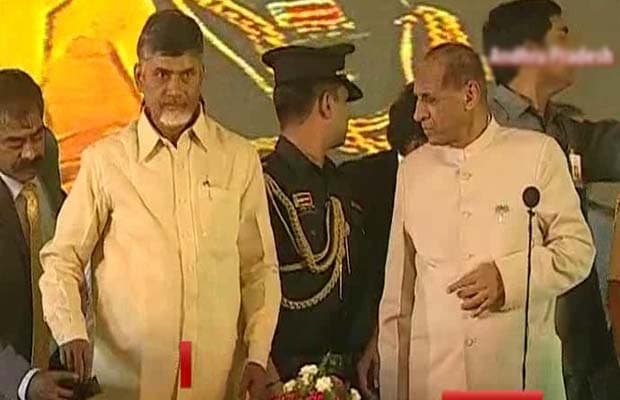


N. Chandrababu Naidu, the Telugu Desam Party chief, officially took oath as the Chief Minister of Andhra Pradesh in a grand ceremony attended by Prime Minister Narendra Modi and Union Home Minister Amit Shah. The ceremony also had prominent film personalities like Rajinikanth and Chiranjeevi on stage. Naidu's son and TDP general secretary Nara Lokesh took on the role of hosting the event. Along with Naidu, Jana Sena chief Pawan Kalyan and Nara Lokesh also took oath as cabinet ministers. Naidu was elected as the leader of the ruling coalition in Vijayawada earlier this week, with Kalyan proposing his name and all members of the coalition in agreement.
N. Chandrababu Naidu: A Political Icon in Andhra Pradesh
N. Chandrababu Naidu is a prominent Indian politician who has served as the Chief Minister of Andhra Pradesh three times. He is the founder of the Telugu Desam Party (TDP) and has played a significant role in the politics of the state.
Political Background:
Naidu began his political career as a student leader in the 1970s. He was elected to the Andhra Pradesh Legislative Assembly for the first time in 1978. In 1983, he joined forces with N.T. Rama Rao to found the TDP, which quickly became a dominant force in Andhra Pradesh politics.
Chief Minister (1995-2004):
Naidu served his first term as Chief Minister from 1995 to 2004. During this period, he implemented several ambitious infrastructure projects, including the construction of Hyderabad's Rajiv Gandhi International Airport and the development of IT hubs in the city. He also initiated reforms in education, healthcare, and governance.
Chief Minister (2014-2019):
Naidu returned to power in 2014 after forming an alliance with the BJP. During his second term, he continued to focus on economic development and launched programs such as the Amaravati Capital City project and the Pattiseema-Srisailam Lift Irrigation Scheme.
Chief Minister (2022-present):
In 2022, Naidu was elected as the leader of the TDP-Jana Sena Party alliance and took oath as Chief Minister of Andhra Pradesh for the third time. He faces the challenge of reviving the state's economy, which has been impacted by the COVID-19 pandemic and the bifurcation of the state in 2014.
Top 5 FAQs and Answers:
1. Why is N. Chandrababu Naidu known as "CBN"?
Answer: CBN is the acronym for Chandrababu Naidu, his initials.
2. What is the Telugu Desam Party (TDP)?
Answer: The TDP is a regional political party based in Andhra Pradesh. It was founded by N.T. Rama Rao and N. Chandrababu Naidu in 1983.
3. What were the highlights of Naidu's first term as Chief Minister?
Answer: Naidu's first term was marked by infrastructure development, economic reforms, and initiatives in education and healthcare.
4. What are Naidu's priorities for his third term as Chief Minister?
Answer: Naidu's focus is on reviving the state's economy, completing ongoing infrastructure projects, and improving healthcare and education.
5. What is the significance of the TDP-Jana Sena Party alliance?
Answer: The alliance between the TDP and Jana Sena Party aims to provide a strong opposition to the ruling YSR Congress Party in Andhra Pradesh.

The Supreme Court has put a temporary hold on the Kerala High Court's ruling that 404.76-acre Munambam land is not Waqf property. This came after a Special Leave Petition was filed by the Kerala Waqf Samrakshana Vedhi, which contested the High Court's verdict. The Court clarified that despite the stay, the State Government was right in appointing a one-member Judicial Commission to probe the history and nature of the land. Local residents, however, have opposed the petition and argued for their right to the land.

The Andhra Pradesh State Cabinet, chaired by Chief Minister N Chandrababu Naidu, approved a wide range of proposals in the fields of urban development, industries, energy, tourism, infrastructure, and welfare. These decisions are expected to attract an investment of over Rs 25,000 crore and create more than 1.1 lakh jobs. The Cabinet also approved a 3.64% hike in DA/DR for government employees and pensioners, and other initiatives such as the reconstruction of check-dams and the upgradation of teachers in tribal welfare schools.

The Supreme Court has granted a stay on the Kerala High Court's finding that the Munambam land in Ernakulam district is not waqf property. The Court also ordered that the current status quo of the land be maintained until the next date of hearing. Although the High Court's declaration will remain stayed, the inquiry commission headed by former judge Justice CN Ramachandran Nair can continue to function. The case involves a dispute over 135 acres of land that was originally gifted to Farook College, now facing protests and challenges from the local residents.

The passing of former Union Home Minister and Congress heavyweight Shivraj Patil has left a void in the political landscape of Maharashtra. His tenure in the Ministry of Home Affairs was marked by several contentious moments, including controversies over his response to terror attacks and criticism over his attire during a national security crisis. His resignation after the 26/11 attacks in Mumbai had a lasting impact on his reputation, as leaked US diplomatic cables described him as "spectacularly inept". Despite this, Patil is being fondly remembered by Congress leaders for his dedication to public service and contributions to the nation's democratic institutions.

Delhi Police Commissioner Rakesh Asthana was honoured during the 'Khaki Ke Sang Shiksha Aur Umang - YUVA Mashaal' programme at Begumpur, Delhi. The event, hosted by the Rohini District, aimed to recognize the efforts of Grameen Police Sahyog Samiti members and social workers in bringing positive changes to the society. Asthana was presented with a turban by elderly persons and also honoured renowned Olympic Champion wrestler Ravi Dahiya. The programme also aimed to spread awareness about the community outreach initiatives of Delhi Police among residents.

The Lok Sabha erupted into chaos as discussions on electoral reforms turned into a heated confrontation between opposition leader Rahul Gandhi and Home Minister Amit Shah. Gandhi challenged Shah to a debate on 'vote theft' allegations, while Congress MP Gaurav Gogoi expressed dissatisfaction with Shah's response to the opposition's concerns. As the opposition staged a walkout, BJP MP Tejasvi Surya criticized the move and praised Shah's speech for effectively countering their propaganda. Prime Minister Narendra Modi also commended Shah for exposing the lies of the opposition.

Former JNU student and activist Umar Khalid, who is an accused in the Delhi riots conspiracy case, has been granted interim bail for 14 days to attend his sister's wedding on December 27. This comes after multiple failed attempts to secure bail, with the court allowing temporary relief for family reasons. Khalid has been instructed to stay away from social media and can only meet family members, relatives, and close friends during the bail period.

The Maharashtra Assembly was in chaos as opposition parties raised concerns over the recent police encounter of government consultant Rohit Arya. The lawmakers claimed that the encounter was wrongful and questioned why Arya was not just shot in the leg instead. It was revealed that Arya had worked on several government projects but had not been paid for his services, leading to the extreme step. The state government has assured an ongoing inquiry into the matter.

During a lively Question Hour in the Lok Sabha, BJP MP Anurag Thakur accused a TMC MP of smoking an e-cigarette inside the House. Speaker Om Birla promised action if a written complaint is filed, while pointing out that the use of e-cigarettes is not allowed in the Lok Sabha. The incident highlights the ongoing debate on the ban on e-cigarettes in India.

A heated commotion erupted in Parliament during Question Hour on Thursday when BJP MP Anurag Thakur accused a Trinamool Congress member of using an e-cigarette in the House, a violation of both parliamentary conduct and national law. Speaker Om Birla responded by sternly stating that no such permission existed and urged Thakur to file a complaint if he had evidence to support his allegation. Amidst the back-and-forth, Thakur questioned if e-cigarettes had been allowed in the Sadan, given their nationwide ban.